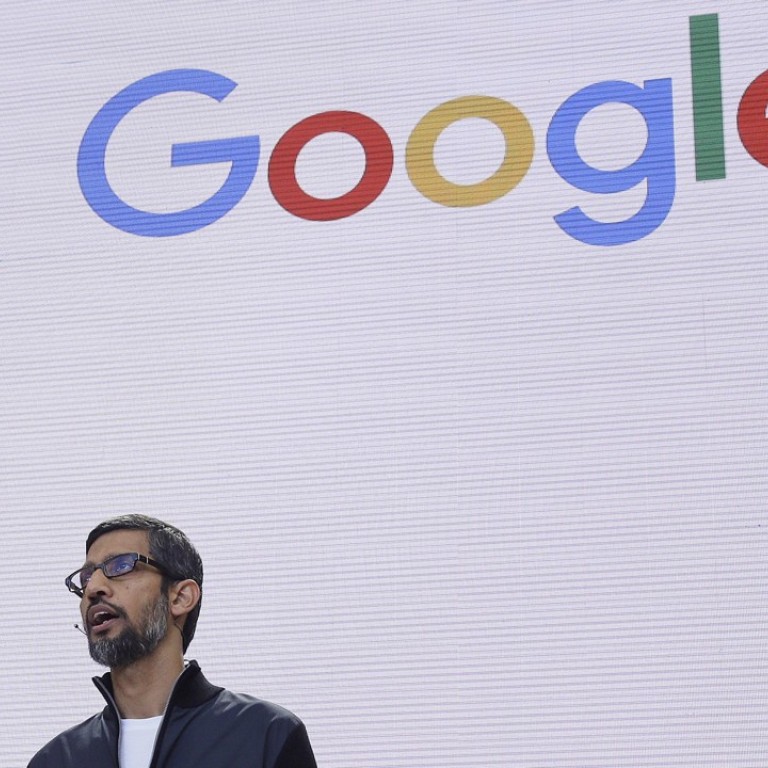
Google CEO says China search engine would serve 99 per cent of queries, takes a swipe at Baidu
Project Dragonfly is reported to be the code name for Google’s secret mission to develop a censored search app specifically for China
Google chief executive Sundar Pichai publicly addressed his company’s plans to re-enter the Chinese market with a search and news-oriented product for the first time on Monday, saying such a service would be capable of serving 99 per cent of queries.
Speaking at Wired’s 25th anniversary summit in San Francisco, Pichai described the Chinese market as “important for us to explore” given its size and the very high likelihood that it will become the largest and most lucrative internet-using population on the planet, according to an Abacus reporter who attended the event.
“We wanted to learn what it would look like if Google were in China,” Pichai said. “It’s very early, we don’t know whether we would or could do this in China but we felt like it was important for us to explore. I think it’s important for us given how important the market is and how many users there are.”
Project Dragonfly was earlier reported to be the code name for Google’s secret mission to develop a censored search app specifically for China, which would blacklist websites on human rights, democracy, religion and other issues deemed sensitive by the Chinese government, according to a report published in August by The Intercept. In August Pichai said that plans to re-enter China with a search engine were “exploratory” and in the “early stages”, according to Bloomberg.
Pichai’s comments on Monday suggested that Dragonfly was an experiment to see if Google could operate a search engine in China without violating government restrictions but he underlined that Google was committed to its values of freedom of expression, user privacy and the rule of law.
Ben Gomes, Google’s search engine chief, told employees that China was “arguably the most interesting market in the world today” and that Google needed to be there, according to a leaked internal email published earlier this month by The Intercept.
“It’s not just a one-way street. China will teach us things that we don’t know,” Gomes said. “We have built a set of hacks and we have kept them. If there is a way to sort of freeze some of it, so it can be brought off the shelf and quickly deployed while we are dripping it all out, and changing it, we should take the long-term view.”
Google has come under domestic criticism after reports it was considering re-entering the Chinese search engine market and would agree to comply with China’s internet censorship and surveillance policies. The developments also come at a sensitive time for US-China relations amid an escalating trade and technology war.
In an August 31 letter to US senators, Pichai wrote: “We hope to stay at the forefront of technology developments and believe that Google's tools could help to facilitate an exchange of information and learning that would have broad benefits inside and outside China.
“Google has been open about our desire to increase our ability to serve users in China and other countries. We are thoughtfully considering a variety of options for how to offer services in China in a way that is consistent with our mission.”
Numerous employees have signed an open letter calling for Google to abandon the project, which critics fear will suppress free expression in China and be weaponised by the country’s government as a means of silencing dissidents and surveilling its citizens.
The US Congress and the White House have also expressed disapproval, calling the potential product a threat to democracy and a way to “strengthen Communist Party censorship and compromise the privacy of Chinese customers", according to US Vice-President Mike Pence.
Last month, Google research scientist Jack Poulson publicly resigned from the internet giant and has slammed the project to relaunch a search product in China as “unethical” and antithetical to the company’s values.
“I was forced to resign my position on August 31, 2018, in the wake of a pattern of unethical and unaccountable decision making from company leadership,” Poulson wrote in his letter of resignation. “This culminated in their refusal to disclose information about Project Dragonfly, a version of Google Search tailored to the censorship and surveillance demands of the Chinese government.”

